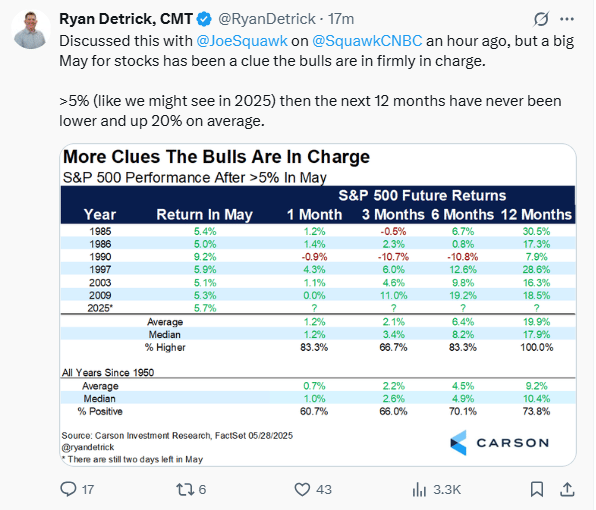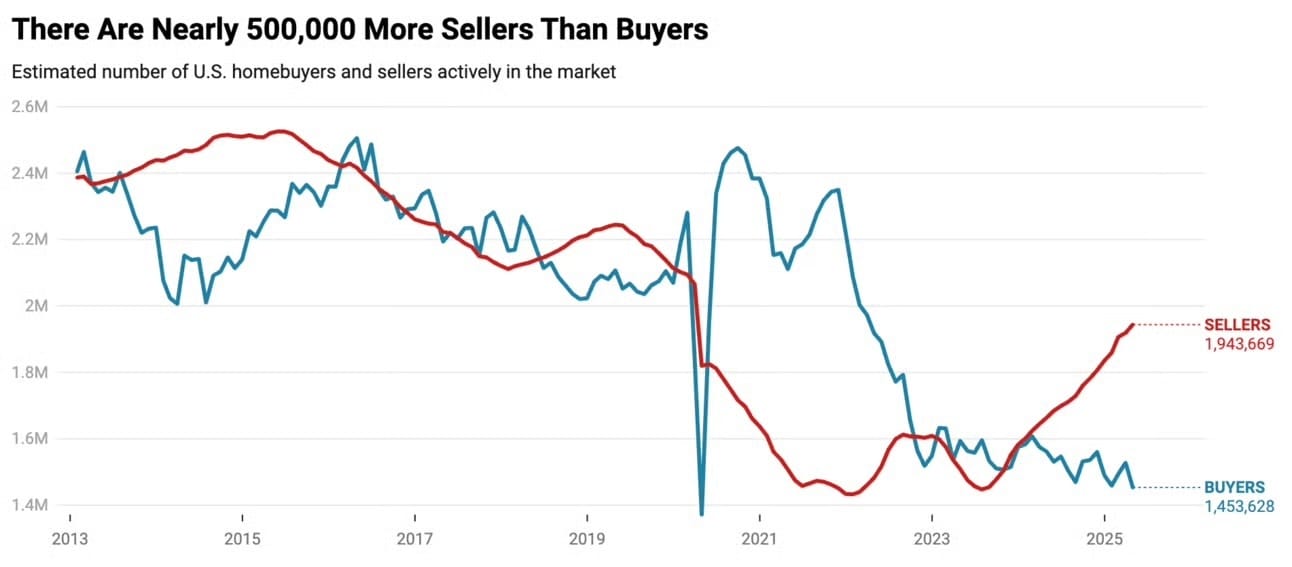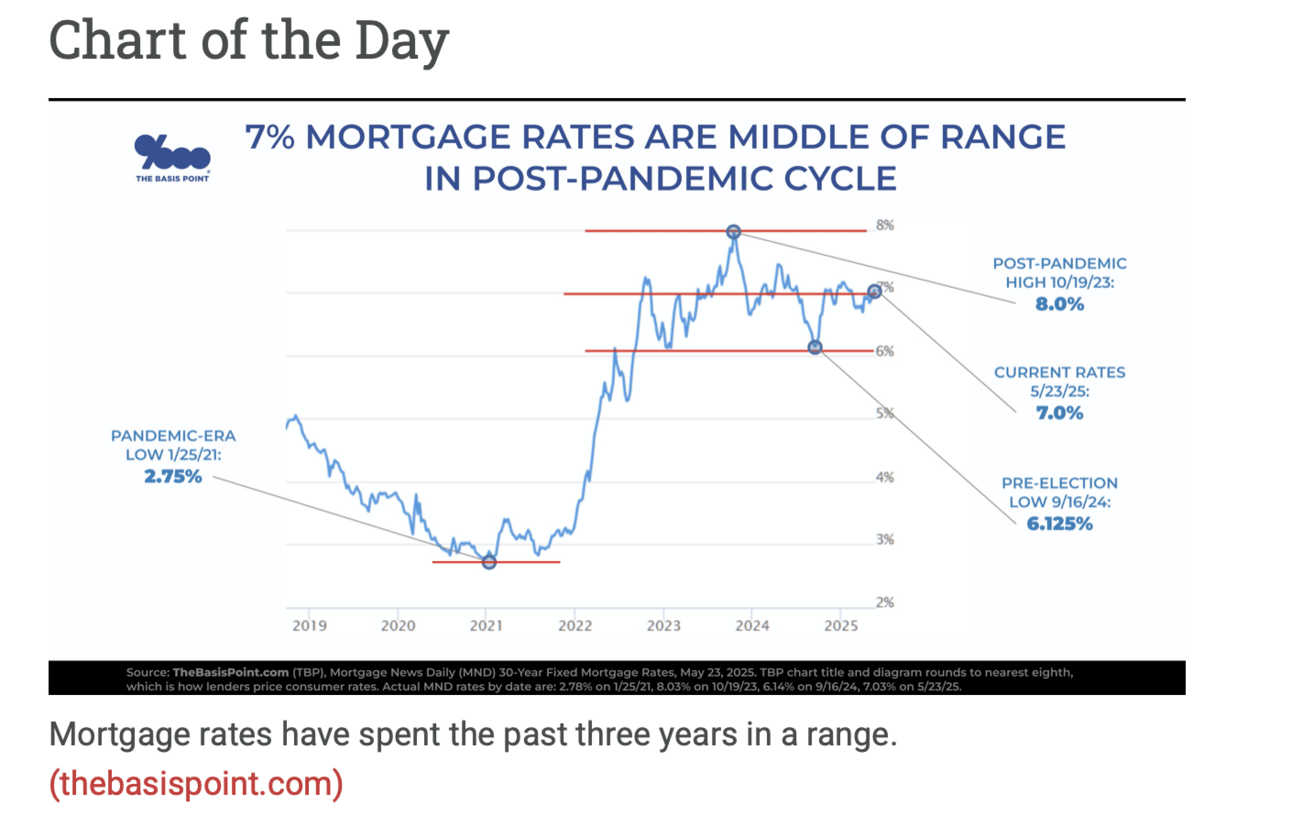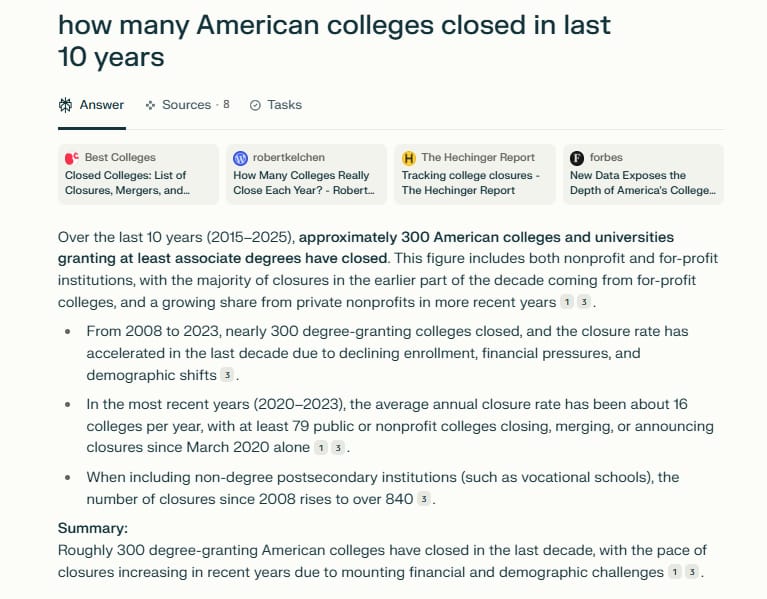- TOPLEY'S TOP 10
- Posts
- Smarter in 10 Minutes
Smarter in 10 Minutes
The Value of Sports Franchises Skyrockets

….
…
…
3. iPhone Sales are Half of AAPL Revenue
Food for Thought: Apple’s net sales by product category:
…
…
…
6-7. Real Estate Friday
Housing Market Changing to Buyers Market?? Home sellers vs. buyers. "There are 34% more sellers in the market than buyers. At no other point in records dating back to 2013 have sellers outnumbered buyers this much. In other words, it’s a buyer’s market."
Summer rentals in the Hamptons are down 30%
Via CNBC: Summer rentals in the Hamptons are down 30% from the same period in previous years, according to Judi Desiderio of William Raveis Real Estate.
Brokers who focus on ultra-high-end rentals are seeing an even bigger drop and say their rental business is down between 50% and 75%.
Some renters may be holding out for better deals or waiting to book, but brokers privately say there are other factors at play.
Summer rentals in the Hamptons are off to a chilly start to the season, as unrented homes start to pile up and sales slow, according to brokers.
Hamptons rentals are down 30% from the same period in previous years, according to Judi Desiderio of William Raveis Real Estate. Brokers who focus on ultra-high-end rentals say their rental business is down between 50% and 75%.
“People are holding on to their money,” said Enzo Morabito, head of the Hamptons-based Enzo Morabito Team at Douglas Elliman. “They don’t like uncertainty.”
Of course, Hamptons renters often wait until the last minute to book July and August rentals. Brokers say this year may be starting even later due to cold, rainy weather in May. Some renters may also be holding out for better deals in a Hamptons market that has become far more expensive after Covid.
Yet brokers and renters say privately that the volatility in the stock market and economic uncertainty sparked by the ever-changing tariff landscape has made some affluent renters and even some buyers hold off on a pricey Hamptons vacation this summer.
After the post-election euphoria in markets at the end of last year, brokers saw a surge in interest from potential renters in January and February. But as spring arrived, along with the April tariff announcements, the early interest didn’t translate into rentals.
Morabito said he represents several homeowners with large waterfront and luxury properties that typically would have been rented by March or April. Today, they’re still available. He said some homeowners who rent out three or four homes in the Hamptons during the summer may start to question their investments after this summer if renters don’t start emerging.
On the plus side, the rise in unrented inventory means potential bargains and choice for renters. Brokers say some listings have started lowering their prices by 10% to 20% in hopes of saving the summer. Some homeowners are adding more flexibility, allowing for shorter one- or two weeks stays in hopes of getting renters.
Gary DePersia of My Hampton Homes said the best houses in the Hamptons typically get rented early in the year. “But this year I have great rentals available in every town, from Southampton to Montauk.”
While tariffs and economic uncertainty may play a role in the slump, he said renters seem to have been waiting longer and longer every year, perhaps holding out for better deals. Eventually, he said, they end up renting.
“I think a number of people have deferred decisions, or they weren’t sure what [they were] going to do, go to Europe or the West Coast,” he said. “They will realize they want to be in the Hamptons; they have lot of friends and colleagues here and then they start scurrying around for rentals.”
Desiderio said the combination of weather and grim economic headlines made for a slow start that will quickly reverse.
“I believe this year there was so much ‘dark noise’ out there financially, and geopolitically, and the weather was not conducive to thinking of summertime,” she said. “There’s no doubt that by the time July 1 is upon us, all of the rentals will be taken this year.”
When it comes to home sales, the Hamptons real estate market remains fairly strong, despite relatively low inventory. Sales in the first quarter were down 12% from a year ago, although the median sales price jumped 13% to a record $2 million.
Brokers say when a quality home in the Hamptons is priced right, it sells immediately. They add that the surge in high-end sales in Manhattan over the past two months could also lift the Hamptons market.
“I just had two Canadians put a bid on an $18 million house, sight unseen” Morabito said. “When Manhattan comes alive, we always follow.”
Mortgage Rates 3-Year Range
…
…
…
10. Timeless Principles From History to Live a Successful Life
From Psychology Today: What Benjamin Franklin can teach you about leading a life of success.
Key points
Strong principles can guide our behavior for the better.
Benjamin Franklin wrote 13 principles of conduct which helped shape the path for his influential life.
Industriousness, frugality, transparency with others, and balance are key.
I recently read the biography of Benjamin Franklin,1 and it did not disappoint. Franklin grew up in working-class conditions, starting his career early on as a tradesman and then pivoting into writing for and producing newspapers. He decided he was destined for more at an early age. As such, he created 13 guiding principles on a long ship ride across the Atlantic, which shaped the path to becoming the esteemed scientist, writer, politician, and founding father over the next 50 years.
Unbeknownst to most, Franklin was also a savvy lay psychologist. In this article, I will describe his 13 necessary virtues and how modern psychology supports them:
Principle #1: Temperance: “Eat not to dullness; drink not to elevation.”
Franklin was a practical man who preferred concrete writing/thinking. His first principle calls for eating and drinking in moderation, not to excess.
Modern medicine confirms the wide variety of health benefits that come from avoiding overeating and obesity, including the promotion of longevity.2 Likewise, imbibing alcoholic beverages frequently contributes to an increased risk of a variety of diseases and all-cause mortality.3 More likely along the lines of Franklin’s thinking when creating this first principle, gluttony from food and alcohol can stifle personal productivity and diminish others’ perception of you.
Principle #2: Silence: “Speak not but what may benefit others or yourself; avoid trifling conversation.”
Franklin hosted a variety of philosophical clubs throughout his life. These clubs would often involve debates and intellectual sparring between members. Franklin cut his teeth during these debates, which contributed to him evolving into the politician, diplomat, and founding father that he became. In his professional and personal life, Franklin preferred deep conversation over small talk. Social scientists have found that deeper conversational topics promote social bonding more than small talk.
Principle #3: Order: “Let all your things have their places; let each part of your business have its time.”
Being organized in one’s physical spaces and in how one spends their time was important to Franklin. Both facets of this wisdom help us enhance personal productivity while simultaneously avoiding careless errors, such as losing an important document or missing an important business meeting. The order principle taps into the personality trait of conscientiousness, which is the strongest of the Big Five traits in predicting success metrics.
Principle #4: Resolution: “Resolve to perform what you ought; perform without fail what you resolve.”
Here we see another tried and true statement about honoring one’s word. Franklin was a strong believer in commitment and performing work dutifully. Those who stick to their professional and personal commitments are held in higher regard compared to those who fail to do so.7
Principle #5: Frugality: “Make no expense but to do good to others or yourself (i.e., waste nothing).”
Franklin did not tolerate financial wastefulness. He developed frugal habits early on in life. Spending money wisely was always front and center of Franklin’s mindset. Even later in life, when Franklin was wealthy, he practiced and preached the importance of economical behavior. He often wore old robes to high-stakes political meetings (perhaps to a fault), and he was quick to instill a lesson in frugality whenever a family member requested something extravagant from him. Indeed, research suggests that materialistic aspirations are negatively associated with happiness and psychological health.
Principle #6: Industry: “Lose no time; be always employed in something useful; cut off all unnecessary actions.”
The industry principle was the golden rule for Franklin. The list of lifetime accomplishments on Franklin’s CV is as astonishing: He discovered electricity, understood the cause of colds (germs, not cold air), observed that exercise prevents disease and exercise intensity is more important than duration, linked illness across a variety of trades as being caused by lead poisoning, established police and firefighting systems, established a postal system between the colonies and worked as postmaster, and established the declaration of independence. Productivity yields meaning in life, which is an important component of global well-being.
Principle #7: Sincerity: “Use no hurtful deceit; think innocently and justly, and, if you speak, speak accordingly.”
Franklin was a proponent of telling the truth above all else. Franklin was a gentlemanly politician who preferred to discuss matters cordially and thoroughly. The sincerity principle operates similarly to authenticity, a construct that describes Franklin well and is associated with increased likability.
Principle #8: Justice: “Wrong none by doing injuries or omitting the benefits that are your duty.”
Treat others fairly and fulfill your moral duties. Avoid causing physical or emotional damage to others and go further by helping others whom you consider your adversary if it is your job to do so. This principle helped Franklin serve effectively as an intermediary between the U.S. and Britain during tense times. Psychology research confirms that seeking revenge can have negative consequences, personally and socially.
Principle #9: Moderation: “Avoid extremes; forbear resenting injuries so much as you think they deserve.”
The key idea here is to stay balanced in life. Franklin advocates for harmony across disciplines as evidence of the variety of accomplishments and careers he held. Social science research supports the idea that balance is important for avoiding burnout and maintaining creativity and consistency.
Principle #10: Cleanliness: “Tolerate no uncleanliness in body, clothes, or habitation”
Let this principle be your friendly reminder to bathe. Although perhaps less enlightening than the other principles, keep in mind this was before running water and the germ theory of disease. As silly as this sounds now, Franklin was forward-thinking in his cleanliness principle, which may have contributed to his significantly longer than average life. Health scientists are now unanimous in their recommendation of personal hygiene practices.
Principle #11: Tranquility: “Be not disturbed at trifles, or at accidents common or unavoidable.”
Franklin was a student of Stoic philosophy. If something negative happens to you that is outside of your control, accept your bad luck and move on without brooding in negative emotions. Psychology research finds that ruminating on negative events hurts well-being and mental health.
Principle #12: Chastity: “Rarely use venery but for health or offspring, never to dullness, weakness, or the injury of your own or another’s peace or reputation.”
Keep it in your pants unless you need exercise or are trying to have kids with your partner. This one is a bit personal to Franklin: Franklin’s first child was conceived out of wedlock to a woman who was never revealed by Franklin nor discovered by historians. Franklin was criticized for his personal indiscretion by enemies throughout his career, and it took a toll on his marriage. Recent research finds that sexual misconduct is punished even more harshly than academic misconduct (misreporting or faking data).15 And, of course, all the news headlines of infidelity amongst household names support the proposition of the damage that can be done to one’s reputation.
Principle #13: Humility: “Imitate Jesus and Socrates”
Practice humility by learning from wise and virtuous role models. Franklin was a lifelong learner and an astounding scholar, receiving several honorary doctoral degrees despite having zero formal education. He believed in learning from others, which aligns well with the classic psychology finding of observational learning.
…
Did someone forward this email to you? Get your own:
Disclosure
Indices that may be included herein are unmanaged indices and one cannot directly invest in an index. Index returns do not reflect the impact of any management fees, transaction costs or expenses. The index information included herein is for illustrative purposes only.
Material for market review represents an assessment of the market environment at a specific point in time and is not intended to be a forecast of future events, or a guarantee of future results.
Material compiled by Lansing Street Advisors is based on publicly available data at the time of compilation. Lansing Street Advisors makes no warranties or representation of any kind relating to the accuracy, completeness or timeliness of the data and shall not have liability for any damages of any kind relating to the use such data.
To the extent that content includes references to securities, those references do not constitute an offer or solicitation to buy, sell or hold such security as information is provided for educational purposes only. Articles should not be considered investment advice and the information contain within should not be relied upon in assessing whether or not to invest in any securities or asset classes mentioned. Articles have been prepared without regard to the individual financial circumstances and objectives of persons who receive it. Securities discussed may not be suitable for all investors. Please keep in mind that a company’s past financial performance, including the performance of its share price, does not guarantee future results.
Lansing Street Advisors is a registered investment adviser with the State of Pennsylvania.








